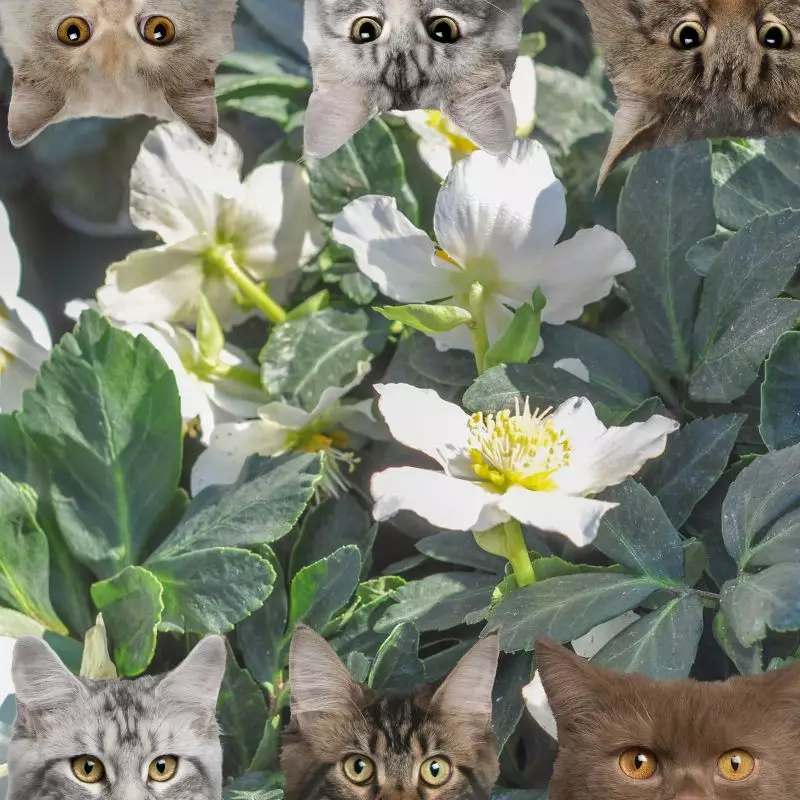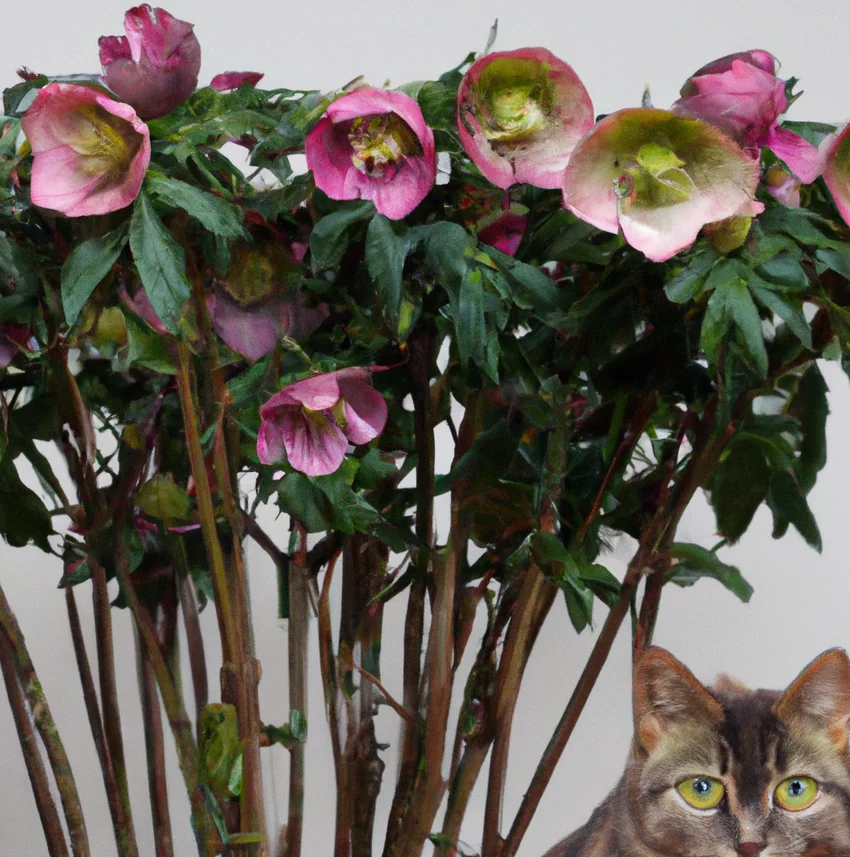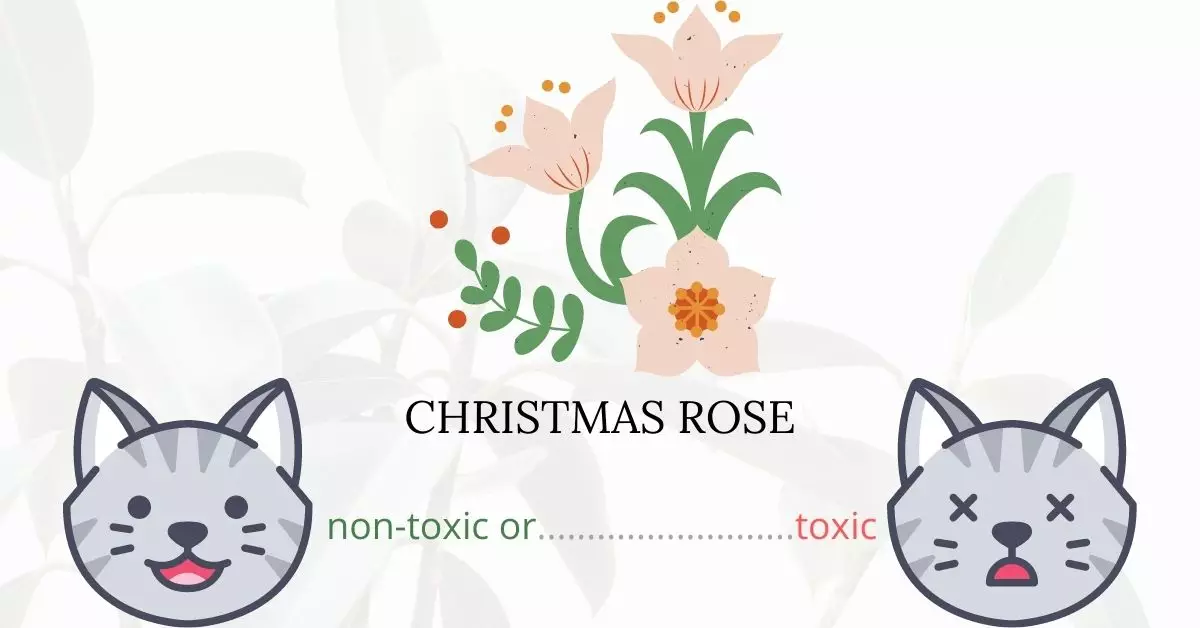Absolutely, Christmas Rose, also known as Lenten rose, Easter rose, or Hellebore, poses a threat to our feline companions. It contains substances like helleborin, hellebrin, helleborein, saponoside, and protoanemonine. These compounds can lead to gastrointestinal symptoms, respiratory and central nervous system depression, and more in cats. When ingested, symptoms such as gastrointestinal upset, hypersalivation, mouth and throat tingling, and abdominal pain may be evident.
It’s vital for cat owners to be aware, as Christmas Rose is popularly cultivated for decorative purposes in gardens, making it easily accessible to curious cats. Despite the initial mouth discomfort they might experience, cats may consume enough to manifest severe poisoning symptoms.
This article is the result of a collaborative effort with a team of experienced DVMs (doctors of veterinary medicine). Their insights ensure that we deliver accurate and up-to-date information concerning the potential risks of various plants, like Christmas Rose, on felines. Our research also incorporates findings from high-authority websites such as ASPCA and PetMD for a comprehensive understanding of every plant discussed.
Clinical Signs of Christmas Rose or Hellebore Poisoning in Cats

When cats come into contact with, or ingest parts of, the Christmas Rose plant, their bodies react to the toxic compounds present in the plant. Here’s a breakdown of the symptoms and their causes:
- Vomiting: A common immediate reaction when cats ingest toxic substances. The body attempts to rid itself of the harmful compounds.
- Diarrhea: The digestive system tries to expel the toxins as quickly as possible, leading to loose stools.
- Drooling: The protoanemonine in the plant can cause a burning or tingling sensation, prompting excessive salivation.
- Tingling sensations in the mouth and throat: Caused by the plant’s saponoside and protoanemonine, which irritate the sensitive mucous membranes of the mouth.
- Pain in the abdomen: The digestive tract reacts to the plant’s harmful substances, causing discomfort and cramps.
- Breathing problems: As the central nervous system is affected, the cat may experience respiratory depression.
- Cardiac arrhythmias: The cardiac glycosides like helleborin, hellebrin, and helleborein can interfere with the heart’s normal rhythm.
- Delirium: Central nervous system depression can lead to a state of intense confusion or delirium.
- Convulsions: A severe neurological reaction to the plant’s toxins which affects the brain.
- Aggressive behavior: Disorientation and pain can cause behavioral changes, including uncharacteristic aggression.
- Paralysis: In extreme cases, the neurotoxins in the plant can lead to paralysis, highlighting the severe danger of the plant.
Additionally, direct skin contact with Christmas Rose can cause skin irritation, as the plant’s toxins can be abrasive to a cat’s sensitive skin. Always monitor your feline friend for any of these signs if you suspect contact or ingestion of the plant, and consult with a veterinarian immediately.
First Aid and Treatment of Christmas Rose or Hellebore Poisoning in Cats

If your pet has recently consumed poisonous substances, vomiting will be induced or gastric lavage will be performed to clear the stomach contents, followed by the administration of activated charcoal to absorb toxic components in the gastrointestinal tract and reduce absorption in the gut. Antacids, which coat the gastrointestinal tissues and relieve pain and discomfort, can be used to treat gastrointestinal problems.
In case cardiac symptoms arise, atropine, a drug used to treat heart malfunction, may be given intravenously. If your cat develops respiratory distress, oxygen therapy will be provided. Additional organ functions, such as the liver and kidney, will be closely monitored, and any deficits will be treated as needed.
Recovery from Christmas Rose or Hellebore Poisoning in Cats

If your cat develops respiratory, cardiac, or organ function problems, he or she may require continual medication. Make sure you follow the veterinarian’s recommendations for post-treatment care. The physician may also suggest a particular diet to prevent organ distress in your cat.
Prevention of Christmas Rose or Hellebore Poisoning in Cats
Christmas rose may be unpalatable to cats due to its bitter taste but to prevent another incident of poisoning, it is better to remove this plant from your home and gardens. If your cat ingested the said plant outdoors, you may do some workarounds to keep your cat inside your home to limit his time outside.
If you love plants but have cats at home, check out these lists:





